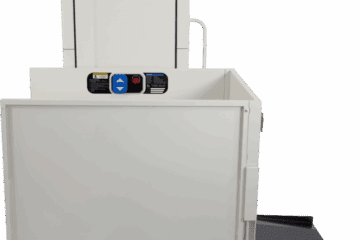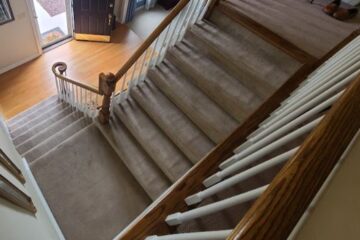In the eastern Pennsylvania cities of Allentown, Bethlehem, Easton, and surrounding communities like Macungie, Emmaus, Whitehall, and Nazareth, many Lehigh Valley seniors are asking, “What are the best ramp options to gain access in and out of a home?” Many who ask these questions are individuals who have stair lifts in the home and want greater accessibility throughout their entire property.
There are several types of home wheelchair ramps available that are designed to provide access for individuals who use wheelchairs or other mobility devices. Here are some of the most common types:
- Threshold ramps: These ramps are designed to provide a smooth transition over small raised door thresholds and are typically made of aluminum or rubber.
- Portable ramps: These ramps can be easily transported and installed as needed, making them a popular option for those who need temporary or occasional access to different areas of their home. They are often made of lightweight aluminum.
- Modular ramps: These ramps are designed to be permanently installed and can be customized to fit the specific needs of the individual and their home. They are typically made of aluminum or steel.
- Folding ramps: These ramps are similar to portable ramps but can be folded up for easier storage and transportation. They are often made of aluminum.
- Track ramps: These ramps consist of two separate tracks that can be placed side by side to create a ramp. They are typically made of aluminum and are designed for use with scooters and other smaller mobility devices.
- Incline platform lifts: These are not technically ramps, but rather motorized platforms that move up and down along a track to provide access to higher levels of a home. They are typically installed in stairwells and can be used with wheelchairs and other mobility devices.
It’s important to choose the right type of ramp based on your specific needs and the layout of your home. Consulting with a professional contractor or accessibility expert can help ensure that you select the best option for your situation.
The cost of an aluminum residential wheelchair ramp can vary depending on several factors, such as the length, width, height, and weight capacity of the ramp, as well as any additional features or accessories. In general, a basic aluminum ramp can cost anywhere from a few hundred to several thousand dollars.
For example, a basic portable aluminum ramp designed for a 1 to 2 step rise and a weight capacity of 600 lbs can cost around $500 to $1500. On the other hand, a more complex modular ramp system that is customized to fit your home’s layout and includes handrails, landing platforms, and a higher weight capacity can cost several thousand dollars.
It’s best to consult with a professional contractor or ramp supplier for an accurate cost estimate based on your specific needs and requirements. Additionally, some insurance plans may cover the cost of a ramp if it is deemed medically necessary, so it may be worth exploring those options as well.
The payback period for a wheelchair ramp can vary depending on several factors, such as the cost of the ramp, the frequency of use, and the savings or benefits that the ramp provides.
For example, if a ramp costs $3,000 to install and is used twice a day for five years, that would be a total of 3,650 uses over the course of the ramp’s lifespan. If the cost of an alternative solution, such as hiring someone to assist with entry and exit, would be $10 per use, then the ramp would provide a savings of $36,500 over the course of its lifespan.
In this example, the payback period for the ramp would be calculated by dividing the initial cost of $3,000 by the annual savings of $7,300 ($36,500 / 5 years), which results in a payback period of approximately 0.4 years or 4.8 months.
However, it’s important to note that the payback period can vary greatly depending on individual circumstances and the specific benefits that the ramp provides. It’s best to consult with a professional contractor or accessibility expert to determine the most cost-effective solution for your needs.
Power Stair Lifts of the Lehigh Valley offers many different top-quality combinations of curved stair lifts and straight stair lifts, vertical platform lifts, and home elevators, to meet the needs of Lehigh Valley and nearby residents. Deciding which option best makes your stay at home as comfortable and convenient as possible is vital. We will not leave you alone in your decision, and suggest you start with the following articles before making a commitment. This is usually a long-term investment, and of course, Power Stair Lifts is available to answer all your questions.
15 Questions To Ask Before Purchasing a Power Stair Lift in the Lehigh Valley
6 Tips to Calculate the Total Cost of Ownership of a Home Stair Lift
Please be sure to visit these other helpful resources:
Lifestyles over 50 — Expert senior content, resources, and care
Power Stair Lifts is a member of Lehigh Valley Aging in Place, a resource helping families help seniors since 2005.
Grab Bar Pros — Safety solutions for bathrooms, entrances, and stairs


